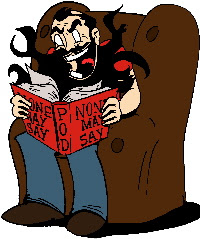Why write about anything other than zombies?
A POD author's greatest challenge is attracting readers. Even books from major New York publishing houses struggle for attention. What can you offer that stands out from the POD horde?
Mouldering ambulant corpses, that's what. Because the public loves zombies. More importantly, the public searches them out.
Look up your favorite non-living-dead POD book on Amazon. Chances are that no one has posted a review. Maybe two or three at most.
Now look up the Amazon pages for some POD zombie novels. As of this writing, David Moody's Autumn (a fine novel which I have read) has received twenty-three reviews. Seventy-two people have reviewed Mark Rogers' The Dead (which I have not read but which looks intriguing). Even a widely-reviled POD zombie novel like Aftermath of the Dead (which I also have not read), with its one-and-a-half star rating, enticed nineteen people to read and review it.
For POD titles, those figures represent an extraordinary level of interest.
Need more proof? Soren Narnia is a terrific writer who has published fifteen POD books in a variety of genres, including literary romances, comedy, and horror (I reviewed his slapstick buddy novel Roll! They Cried here.) Fourteen of those books have nothing to do with zombies. Of those fourteen, nine have zero reviews on Amazon; three have one review each (including my review for Roll! They Cried); one book has two reviews; and the last has three reviews. However, Narnia's remaining book, the splendid zombie novel Song of the Living Dead, has eight reviews -- a 266% increase over Narnia's next-most-reviewed work. Math like that doesn't lie.
The lesson is clear. Writhing, squishy zombie bits pave the road to POD glory. (And big-publishing glory as well -- several prominent literary critics have named Cormac McCarthy's post-apocalyptic novel The Road, published by Knopf, as one of the best books of 2006. And it (essentially) includes zombies!)
I think there is a simple explanation for the popularity of the POD zombie novel. For fans of the zombie genre, pertinent POD novels are easy to find. Go to iUniverse, or Lulu, or Amazon, and search for "zombie." It's like a gunshot to the head: quick, easy, effective.
By contrast, if you're in the mood for a quirky POD comic novel with great character development and a madcap denouement . . . well, good luck finding it. Unless you think trolling through piles of POD PDFs and online previews is fun (like I do), you pretty much have to rely on the handful of POD review sites (like this one, and those at right) for guidance. Big, shambling things such as animated corpses are easy to find through a keyword search. Elusive concepts like humor and emotion are not.
In sum, absent a marketing budget (which most POD books do not have), a POD novel needs a way of letting the world know it exists.
Zombies really stand out in a crowd.
Plus -- and let's not forget this -- they're just really, really cool.
